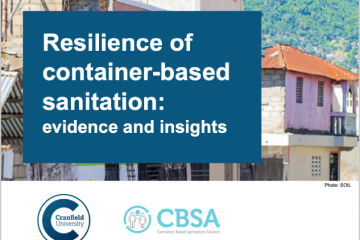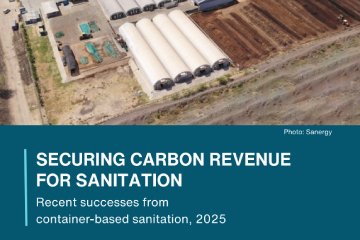CBSA welcomes UN-Habitat’s recently published Global Report on Sanitation and Wastewater Management in Cities and Human Settlements and its urgent call to integrate sanitation and wastewater management with wider urban development.
The report, which aims to provide a global reference on sanitation and wastewater in urban settings, draws attention to challenges facing sanitation while looking forward to positive trends and emerging practices, where it features many CBS innovations and benefits.
Rémi Kaupp, the Container Based Sanitation Alliance’s Executive Director, “We strongly support this report’s call for sanitation to be integrated into wider urban development, which we see as critical for promoting sustainability and upholding human rights. Given this and our close alignment with the report’s recommendations, it’s great to see CBS referenced heavily throughout the report.”
“We strongly support this report’s premise that sanitation is a public good and its call for sanitation to be integrated into wider urban development, which we see as critical for sustainability and fulfilling human rights. Given this and our close alignment with the report’s recommendations, it’s great to see CBS referenced heavily throughout the report.”
Rémi Kaupp, the Container Based Sanitation Alliance’s Executive Director
While the report is clear on the challenges, it is optimistic about several areas, including action in response to climate change and the need for non-traditional financing. These areas are key to our work. We are raising awareness of the climate impacts of sanitation and the potential to reduce emissions through active management and unlock climate finance to incentivise more climate-smart approaches. We are also exploring the potential of other non-traditional finance for CBS, such as results-based financing, to help reduce the financing gap.
The report also expresses excitement about a shift taking place that views wastewater increasingly as a resource rather than a waste stream, which is central to CBS approaches. It sees CBS “at the forefront of harnessing the reuse potential of faecal sludge for the circular economy,” recognising the wide range of resources derived from human waste that CBS services produce.
It also highlights that CBS is:
Shifting the emphasis away from sanitation as infrastructure towards sanitation as service
As CBS is generally run as a full chain service, the report highlights that it could bring the added benefit of more integrated services. It also sees CBS as an example of the role that the private sector can play, acknowledging that sanitation has generally not proven suitable for private investment due to significant capital costs and limited opportunities for cost recovery.
Harnessing digital technology to support new service models and efficient service provision
The report calls for stronger data management systems at the city, national and global levels as a first-level priority for improving wastewater and faecal sludge management. It highlights how digital payments and remote tracking have enabled new service models, particularly in the energy sector, which can also be seen in CBS services. It illustrates this with a description of Loowatt’s services, where customers can use mobile money to pay for collection services and SMS to schedule collections and maintenance and personnel use a mobile app and web platform to manage operations and track waste collection.
Well suited to serving densely populated informal settlements
In addressing responsibilities, the report discusses how mandates and institutional structures can be re-shaped to promote equity and inclusion. Within this, it recognises that CBS offers a model well suited to hard-to-reach, densely populated informal settlements. As low-income households can opt for a subscription-based payment plan with CBS, they are saved from needing to make any initial capital investment to construct containment structures. The report further points to the high levels of customer satisfaction brought by CBS, citing a recent WSUP evaluation of Clean Team, which also found that female customers particularly highly valued the service.
Resilient in climate-vulnerable contexts
In the closing chapter laying out the way forward, the report highlights CBS as one of several options that show strong potential for climate-vulnerable contexts (p126). It points to CBS as a dry sanitation solution that is particularly well-suited to areas prone to water scarcity. The Alliance increasingly sees water scarcity as driving interest in CBS, including among some of our newest members based in South Africa and Cameroon.
In addition to the water-saving benefits highlighted by the report, it should be noted that CBS is also resilient to flooding, another water-related shock exacerbated by climate change. This is because the containers can be sealed to ensure that sludge is never released into the environment, making it a hygienically safe and resilient option in flood-prone areas.
Moreover, CBS brings added benefits for climate mitigation thanks to its capacity to reduce greenhouse gas emissions (GHG) from sanitation. By quickly treating waste and often separating feces from urine, CBS systems reduce the anaerobic degradation that produces methane and nitrous oxide in sanitation systems, which have recently been revealed to contribute significantly to global GHG emissions.
See also WSUP’s article, UN-Habitat report connects advances in sanitation to wider urban development


